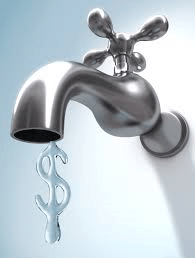
Nearly everyone has holes in their budgets… And as with other kinds of leaks, you may have hardly noticed some of them. But those small drips can quickly add up to big bucks. The trick is to find the leaks and stop them so you can keep more money in your pocket. Here are a few to think about.
Overspending on Auto Maintenance…Are you still paying for an oil change every 3,000 miles? Many models nowadays can last 5,000 to 7,000 miles between changes, and some even have built-in sensors to tell you when it’s time to change the oil. Check your owner’s manual to find the best time for your car’s routine maintenance.
Not Pulling the Plug on Electronics…U.S. households waste $100 a year, on average, to power devices while they are off or on standby mode, according to Energy Star. Electronics that have a clock or operate by remote are typical culprits. The obvious way to pull the plug on your energy vampires is to do just that — pull the plug.
Paying for Things You Don’t Use…Clean-up your bank accounts. Simplify your record-keeping and close any old savings or checking accounts you seldom use, especially if you are incurring monthly fees. Consolidate small accounts with the same registration into one larger account if possible. A single account with a larger balance may qualify for additional bank services.
Note: The opinions voiced in this material are from a third party and are for general information only and not intended to provide specific advice or recommendation for any individual. Please remember that past performance of investments may not be indicative of future results. Different types of investments involve varying degrees of risk, and there can be no assurance that the future performance of any specific investment, investment strategy, or product made reference to directly or indirectly in this newsletter (article), will be profitable, equal any corresponding indicated historical performance level(s), or be suitable for your portfolio. Due to various factors, including changing market conditions, the content may no longer be reflective of current opinions or positions. Moreover, you should not assume that any discussion or information contained in this post serves as the receipt of, or as a substitute for, personalized investment advice from Vermillion Financial Advisors, Inc. To the extent that a reader has any questions regarding the applicability of any specific issue discussed within this newsletter to his/her individual situation, he/she is encouraged to consult with the professional advisor of his/her choosing. A copy of our current written disclosure statement discussing our advisory services and fees is available for review upon request.
Continue reading and jump to the next post,
Rethinking the tax refund

